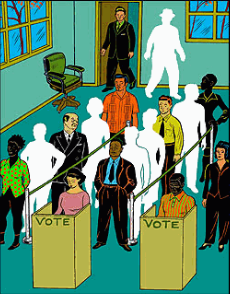
[Editor’s note: Links to all recent Tyee reports on the civic elections follow this article.]
Democracy needs our help.
Norway, flush with offshore oil revenue and pondering its place in Europe, conducted a five year multi-million dollar study on the state of democracy. The key findings of the 50-volume study are that democracy is in peril, citizens must have a reason to become involved in politics, democracy must be rebuilt, particularly at the local level, and reform of the party system is essential.
We should be paying attention. British Columbia recently finished a provincial election, tomorrow many municipalities will vote locally and all Canadians will soon be plunged into a federal election. Based on the Norwegian findings, we may be surprised to learn that the local elections tomorrow, November 19th, could be the most important of them all.
As described by Oxford sociologist Stein Ringen in his New York Times Magazine article "Where now, Democracy?", democracy is a chain. "At one end is the voter, at the other end political decisions. In a democracy, there is supposed to be a link to assure that political decisions are the ones voters want made."
Civic politics are essential to this process. Our involvement in local matters, from the Olympics to dog bylaws, is the crucial first link in the democratic chain. Yet, voter participation in elections is on a downward trend. Many of us are frustrated with political corruption, back-room deals, and decisions that benefit special interest groups and have chosen to wash our hands of the whole mess. While this may seem like the easy route, it comes at an unacceptable cost. To paraphrase Plato: those who believe they are too good for politics end up being ruled by their inferiors.
Canada's democratic health
Political parties sprang up to help organize the voices of voters. As the Norwegian study discovered, political parties help democracy by linking citizens to their representatives, but with falling membership ranks, they have reinvented themselves as professional political machines where the voices of members hold less and less power. How many Canadians even realize that they can join a political party, personally meet their candidates and have a voice in determining party policy? Instead, without public participation, these forums for collective action become tools for the ruling elite to control the masses. In the current Vancouver civic election, there is even a political "party" with no members. Where are the members?
Canada has conducted her own smaller-scale study of democracy, called The Canadian Democratic Audit. The volume entitled Citizens asks "what does it say about the health of Canadian democracy when fewer citizens than ever are exercising their right to vote, and party membership rolls are shrinking?" Of all the variables studied in regards to citizen engagement and voter turnout, age was the most correlative. "Age is the single best predictor of people's political interest," and the most significant drop in political engagement is found in the 18 to 35 category.
On the other hand, people born before 1945, men, university graduates and affluent Canadians are the most involved and interested in politics. If we can assume that people tend to vote for candidates like themselves, this explains the faces we see when we open the newspaper.
Without political involvement, we abdicate our voice. Special interest groups develop veto power in public policy. The few rule the many.
Get going
We have one more day until civic elections and three years to live with the result. It is time to get involved. If you have one hour, google your candidates and read their policies. If you have four hours, call up a candidate you admire and volunteer to help. It only takes a minute to e-mail a candidate to express your concerns.
Much election coverage is inflammatory, partisan, divisive and issue-free. Hold your media to task for this. Ask for the information you need to make an informed decision. The core of democracy is that we elect representatives who bring our views to the table on our behalf, where they are discussed, debated, and, if we elect politicians who are willing to work together for the common good, where collaboration ensues. If you want your views heard, you must elect your voice. We the people must hold a higher vision for our leaders if we value democratic reform.
Rikia Saddy is a Vancouver-based political and marketing strategist who has worked in Canada, the US and Europe.














Tyee Commenting Guidelines
Comments that violate guidelines risk being deleted, and violations may result in a temporary or permanent user ban. Maintain the spirit of good conversation to stay in the discussion.
*Please note The Tyee is not a forum for spreading misinformation about COVID-19, denying its existence or minimizing its risk to public health.
Do:
Do not: